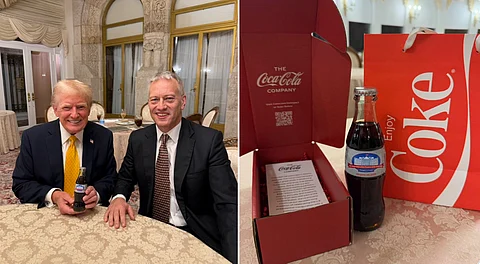

Together tastes better.
That is, unless you’re an executive of the largest soft drink manufacturer in the world going up what is arguably the most powerful anti-DEI activist.
Robby Starbuck announced on Tuesday that he has Coca-Cola next in his sights and plans to out the soda giant’s woke policies sometime later this week.
“Let’s hope they join the rest of us embracing sanity soon,” he wrote on Twitter (“X”).
It comes as Coke is under pressure to make its DEI programs conform with new directives from the Trump White House and recent rulings from the US Supreme Court that make it illegal to discriminate, even on DEI grounds.
Trump is a huge fan of Diet Coke and reportedly has a red button in the Oval Office to order his beverage of choice. So much so, that Coca-Cola gifted him a commemorative bottle on the occasion of his inauguration —even though it criticized him four years earlier for the Jan. 6 attacks on the Capitol.
As it turns out, Coca-Cola is a major government contractor, under the Supplemental Nutrition Assistance Program (SNAP), which helps low-income Americans buy food in addition to supplying US military bases.
According to Starbuck, about 10% of SNAP’s USD$115 billion budget goes to ‘Big Soda’, ostensibly to help people get healthy food with SNAP benefits. That amounts to a de facto subsidy of about $11.5 billion a year, including $75 million in New York City alone.
The USDA has taken steps to improve SNAP's ability to help people buy nutritious food, but even it admits “more work is needed.”
“How does subsidizing Coke do that?” Starbuck asked.
Coca-Cola, along with Pepsi, also provides beverages on military bases and in other government facilities. Last week Coke’s chief financial officer said the company would of course, follow any change in regulations at the national level.”
Pepsi has already done so, informing the Securities Exchange Commission (SEC) in its annual corporate filings that it has removed references to “diversity, equity and inclusion” and its “diverse workforce” in company documentation.
In 2020, it spent $570 million in Black and Hispanic communities to increase representation in its partnerships and supply chains.
Meanwhile, Coca-Cola’s web site still says DEI is “at the heart of our values and our growth strategy and play an important part in our company’s success.” It lists goals such as having women hold 50% of senior leadership roles by 2030 and having its US workforce reflect “national census data at all levels.”
And Coca-Cola isn’t the only target of Starbuck’s ire. Also last week he singled out financial services giant JPMorgan Chase for its “ludicrous” hiring quotas and training practices.
The bank’s DEI initiatives include a five-year, $30 billion program aimed at helping black, hispanic, Latino, and other groups obtain grants and loans for housing, small businesses and supplier diversity.
In its annual letter, JPMorgan’s management team said its DEI policies “enhance business, the general economic well-being of communities and countries, and long-term shareholder value.”
